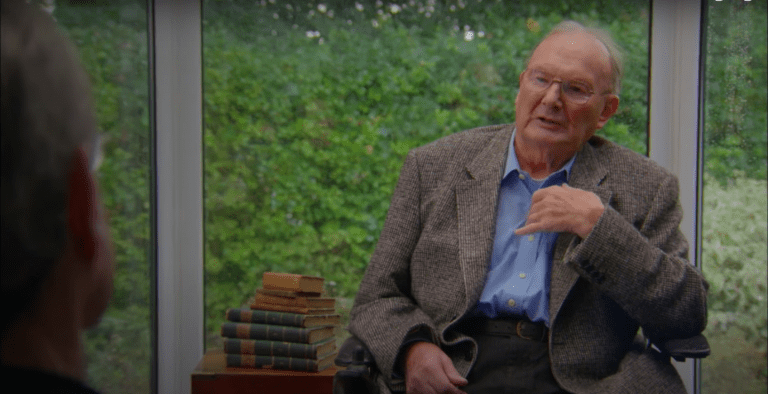
Do all paths lead to God? Is it arrogant to say we’re right and others are wrong? Theologian John Hick (1922-2012) was the world’s best known advocate for pluralism. His final debate on the subject was on the Unbelievable? show, and revealed that his philosophy was emotion rather than evidence-driven.
Religious pluralism has come home to people’s consciousness, making the question a live one for large numbers. It is no longer, as it once was, an exotic question for foreign missionaries. We are aware of our inhabiting a small and fragile planet and of our belonging to a single human race. The awareness of a single planetary culture is rather new and drives the modern debate (Clark Pinnock).
The West has historically been a Judeo-Christian culture, but with advancing travel and computer technology we have seen an increase in both the physical and digital immigration of diverse religious beliefs. It has resulted in a tremendous opportunity to share human experiences but has also presented challenges to an orthodox interpretation of the Christian faith.
How are Christians to understand the deeply held beliefs of our Muslim, Hindu, and Buddhist friends when we believe that “there is no other name under heaven by which we must be saved” (Acts 4:17)? Are there multiple paths to God or is Jesus the only way?
This issue was debated on a rebroadcast of a classic episode of Unbelievable? featuring the late theologian and philosopher John Hick, who advocated for a pluralistic understanding of religion, and Chris Sinkinson, Lecturer in Biblical and Theological Studies at Moorlands College, who defended the orthodox Christian position.
Unity in Experience, Diversity in Expression
John became a Christian as a young man and adopted orthodox evangelical beliefs until he came in contact with other religious traditions, which forced him to reassess the exclusivity of salvation in Christ alone.
I was in mosques and synagogues and Sikh gurdwaras and Hindu temples, all these various places as well of course as Christian churches. And something struck me very forcibly, namely that although the externals are very different…that essentially the same thing was going on in all of them…namely, human beings coming together under the influence of some ancient tradition, which enabled them to open their minds and spirits upward… So the result of all this experience was that it did become fairly clear to me that there are in fact, many paths to God.
Reverence or Revelation
John’s initial conversion to Christianity was an emotional one prompted by a religious experience and not rational investigation. As he interacted with adherents of other faiths, he recognized that their religious experiences were no different than his own, and since it was an emotional response that prompted his conversion in the first place, he was convinced that these religious traditions were just as valid. He began to believe that the foundation of religion was not a particular doctrine but a universal sense of the ineffable.

He abandoned his orthodox Christianity and began to study and write extensively on the idea that there are many paths to ‘God’. I find it fascinating that despite John’s academic bona fides, he was content to build his intellectual worldview on a shaky emotional foundation. He seems to have mistaken reverence for revelation. After all, it isn’t worship that defines religion but rather the One to whom we bend a knee.
John Hick the Transcendental Agnostic
John recognized that in order to justify his belief that all paths lead to ‘God’ he had to make the ultimate object of all worship quite generic. He had to place the disparate conceptions of god held by the various world religions under an uber-God who was so unknowable that the higher one climbed spiritually, the less there would be to fight about. Chris pointed out, however, that John had set the divine bar so low that his ‘Ultimate Reality’ was actually meaningless.
Chris: What I worry about with your term ‘ultimate reality’ is that it…becomes such a lowest common denominator definition of the ultimate object of our worship that there is really no content to it, it becomes emptied of all meaningful content. In your most extended work on this you describe the ultimate reality as beyond good and evil, beyond personal and non-personal, and beyond loving and hating.
John Hick has been described as a ‘transcendental agnostic’ because he believed in a spiritual realm yet remained unsure of who actually resided there. He believed that stubbing our toes on a hillside strewn with idols was a small price to pay for religious unity as long as we continued our pilgrimage to the altar of the unknown God.
The problem is that when he posits an unknowable cosmic entity he has already given preference to the Buddhist and Hindu conceptions of the divine. A move which inconveniently acknowledges that some roads to God are better paved than others.
Man Seeks God
The problem with John’s appeal to the unknowable is that humans are obsessed with knowing and being known. Even the nebulous Hindu Brahman or the Buddhist Nirvana still incorporate middle-man bodhisattvas or avatars to give their spirituality some personality. It appears that any religious system that doesn’t pay homage to the human need for personal relationship with the divine is ultimately hollow, so when John subordinates all religions to ‘The Real’, he transforms worship from a warm embrace to a warm bath.
John likened his understanding of religion to the Copernican revolution where the sun represents the ‘Real’ or ‘Ultimate’ and the various world religions the orbiting planets. He suggested that the ‘Ultimate’ not only sheds light on each tradition but provides experiential warmth for its inhabitants. The problem with this analogy is that there is only one planet where life is found.
Religious significance, therefore, is not found in the number of mystical rocks circling the ‘Ultimate’, but in the only one capable of supporting eternal life. However, since other faith traditions continue to be a part of our religious solar system we cannot just dismiss them as dead planets but must rather ask ourselves why people continue to try to colonize them.
The Proliferation of Religions
In John Walton’s provocative book, The Lost World of Genesis One, he posits that the first chapter of the Bible describes the construction of a Cosmic Temple. While I don’t agree with all his conclusions, I believe his theory is intriguing. Since a temple is a place where God and man meet, it should have the proper acoustics to facilitate a divine encounter. I think it is fair to say that we all experience awe when we contemplate the natural world around us, removed from the sights and sounds of the concrete jungle we feel like we are standing in a cathedral admiring a holy space.
As creatures formed from dust and breath, Adam and Eve were the perfect high priests to facilitate temple communion. Sadly, they confused priesthood with Godhood and were excommunicated into the wilderness. As the generations of exile piled up we found ourselves in a situation where we knew God existed but were very unsure about his identity. We knew we had to worship but were uncertain as to who to offer reverence. Unable to see his face through a glass darkly, our religious vision was clouded and we ended up establishing a plethora of religions to try and commune with God. Paul made this same argument to the Athenians on Mars Hill.
“And he made from one man every nation of mankind to live on all the face of the earth, having determined allotted periods and the boundaries of their dwelling place, that they should seek God, and perhaps feel their way toward him and find him. Yet he is actually not far from each one of us.” (Acts 17:26-27)
The Glass Darkly of Pluralism
As Christians, we recognize that the times of ignorance that produced these various religions has passed. The veil was lifted when the curtain of the Holy of Holies was torn at Jesus’ crucifixion and we are once again invited in to get to know him personally.
“Being then God’s offspring, we ought not to think that the divine being is like gold or silver or stone, an image formed by the art and imagination of man. The times of ignorance God overlooked, but now he commands all people everywhere to repent, because he has fixed a day on which he will judge the world in righteousness by a man whom he has appointed; and of this he has given assurance to all by raising him from the dead.” (Acts 17:29-31)
Fixing a Hole Where the Reign Comes In
St. Paul pointed out that it was Jesus who was the true destination of our pluralistic wanderings. Sadly, our postmodern culture wants to sanctify the politically correct journey rather than embrace the exclusive destination. Life on the spiritual road is held up as being far more tolerant than establishing citizenship in a specific religious town. We all share the same God-shaped hole but we cannot deceive ourselves into believing that the echoes we hear as we groan into the void are all the sounds of a deity. All paths don’t lead to the same God but they do begin with the same spiritual crater, therefore unity will only come when we determine its proper dimensions and get down to the business of filling it properly.
East of Eden
The problem with pluralism is that it treats God like a spiritual add-on to a physical life. Religion becomes a happy place we escape to when life gets hard. So, instead of doing the hard work of filling the spiritual hole we end up distracting ourselves by admiring our ability to build religious ziggurats. Thinking we can get closer to God by climbing to the top of each one, we end up realizing that it isn’t peak experiences we need but rather spiritual grounding.
We all long to commune with God in this earthly temple but have this overwhelming feeling that it needs cleansing. As we look around, we realize that it isn’t the soil, the plants or the animals that need a good washing but rather the human stewards. We find ourselves East of Eden but continue to hear a voice that calls us to “go west young man”. All religions recognize that we are lost in the wilderness, but the real issue is which one has the directions back to the Garden.
Scout Badge religion
John correctly recognized that humans are the problem, but had nothing to offer but multiple religious programs to promote better earthly behavior. He felt that if we just behaved a bit saintlier then we would be on the road to salvation.
John: I don’t see salvation as a yes or no thing? You know, are you saved? Yes or no. I see it as progressive, as a growth in spirituality, and in the spirit of service of humanity.
John based the equality of all religions on the premise that they produce humans of equal moral character. John reduced salvation to acquiring a few more scout badges. The problem, however, isn’t our desire to be better but our inability to do so without a savior.
Most other religions motivate better behavior by invoking the need to reach a certain moral bar, but Christian morality is motivated by a desire to extend the same grace to others that was sacrificially extended to us by Jesus. Salvation isn’t based upon the illusion of becoming a saint but on the reality of acknowledging you are a sinner.
COEXIST
The afterlife would be pretty unappealing if all that was required of our fellow citizens was the assurance that they had walked old ladies across the street and hadn’t kicked the family dog too much!
A heaven where everybody behaves a little bit better hardly seems like a place to spend one’s eternal destiny. I would prefer to go to a place where I get to tell stories of how I have been washed clean rather than a place where I still have to get in line for a shower.
While I don’t know if John ever had a COEXIST bumper sticker on his car, he certainly shares the sentiment. In many ways it accurately describes the way we should live in harmony with other faith traditions, but it confuses getting along in the here and now with our eternal destiny in the already and not yet. We pursue religious truth not to prove we are right, but to ensure that we share the afterlife with as many people as possible.
Climbing Mount Significance
Our postmodern culture has adopted the poorly informed, yet profoundly tolerant stance that ‘all paths lead to God’. We are all just spiritual mountain climbers taking different approaches to the same divine peak. While it is true that all religious paths do end on a summit, the problem is that each summit is located on a completely different mountain range. We can get out our megaphones and congratulate each other for reaching the top of our respective peaks, but let’s put aside the silliness that they all represent the same mountain.
We need to thank John for encouraging us to recognize that we are not the only ones that climb holy mountains, but we must also point out to our fellow climbers that they are scaling molehills while Mount Significance looms in the distance inviting them to climb its glorious Peak with fear and trembling.
Listen to John Hick and Chris Sinkinson’s Unbelievable? debate















